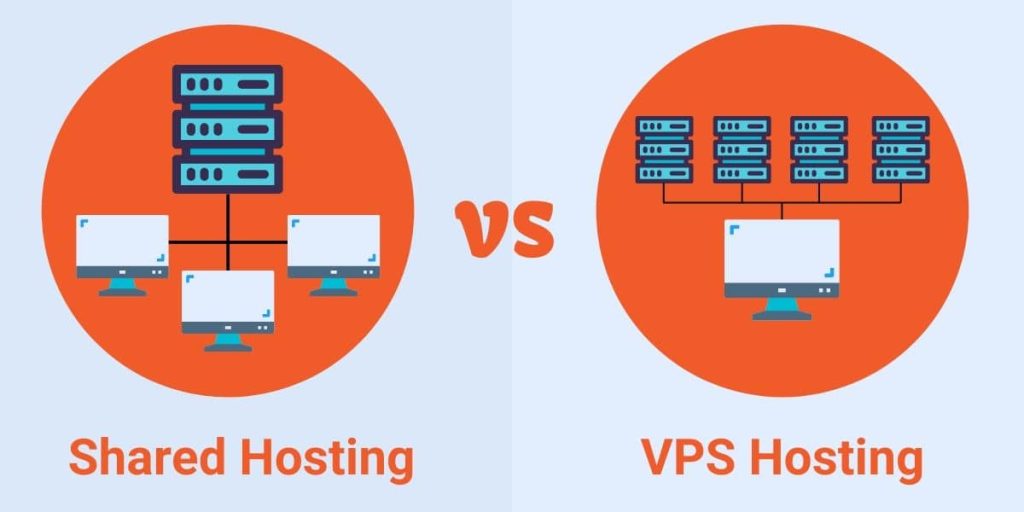VPS vs. Shared Hosting: Which Is Right for Your Site?

When launching a new website, choosing the right hosting solution can significantly influence your site’s speed, reliability, and growth potential. Among the most commonly considered options are shared hosting and VPS (Virtual Private Server) hosting. Each offers distinct advantages and drawbacks depending on the stage of your project, technical experience, and long-term goals. Understanding the differences between the two can help you make an informed decision that best suits your site’s requirements.
What Is Shared Hosting?
Shared hosting is a type of web hosting where multiple websites reside on a single server and share its resources, including CPU, memory, and disk space. It’s a beginner-friendly option, usually offered at very low prices, making it ideal for personal blogs, small business websites, or hobby projects with limited traffic.
One of the main advantages of shared hosting is simplicity. The hosting provider manages most of the technical aspects, such as server maintenance, software updates, and security configurations. For users without deep technical knowledge, this hands-off approach can be incredibly appealing. Additionally, shared hosting plans often come with user-friendly control panels like cPanel or Plesk, enabling users to manage their websites without needing to touch command lines or deal with complex configurations.
However, the convenience of shared hosting comes with trade-offs. Since resources are shared among dozens or even hundreds of websites, any one site consuming too many resources can negatively affect the performance of others. Moreover, shared hosting environments are typically less secure due to the number of users and websites operating on the same server.
What Is VPS Hosting?
VPS hosting offers a middle ground between shared hosting and dedicated servers. While you still share a physical server with other users, each VPS operates as a separate virtual machine with its own dedicated resources, operating system, and configuration settings. This setup provides greater performance, customization, and security compared to shared hosting.
With VPS hosting, you gain root access to your server environment. This means you can install custom software, configure server settings to your preferences, and even host multiple websites with distinct configurations. It’s a flexible solution suitable for developers, businesses scaling up, and websites expecting moderate to high traffic.
VPS hosting also ensures better performance consistency. Since resources are allocated specifically to your VPS, other users’ activities do not directly impact your site. This isolation also improves security, reducing the risk of cross-site vulnerabilities that can be common in shared environments.
Nevertheless, VPS hosting requires more technical expertise. Setting up firewalls, optimizing server performance, and monitoring uptime may fall on your shoulders unless you opt for a managed VPS service. The cost is also higher than shared hosting, though significantly lower than renting an entire dedicated server.
Performance Comparison
From a performance perspective, VPS hosting clearly outshines shared hosting. Websites hosted on VPS servers benefit from faster load times, higher bandwidth capacity, and greater stability under traffic spikes. If your site experiences sudden traffic surges—such as during product launches or marketing campaigns—VPS can handle the load more gracefully than shared hosting.
Shared hosting, on the other hand, is prone to performance bottlenecks. If other users on the same server consume a disproportionate amount of resources, your website may suffer in speed or become temporarily unavailable. While many shared hosting providers attempt to mitigate this through resource throttling or isolation layers, the inherent limitations of shared resources remain.
Security Considerations
Security is another important factor in your hosting decision. In shared hosting environments, the actions of one user can potentially impact others. For instance, if another website on the same server is compromised, your website may be exposed to similar risks. While hosting providers implement various safeguards, such as firewalls and malware scanners, shared hosting will always carry a higher baseline risk due to the number of users involved.
VPS hosting offers a more secure architecture. Because your environment is isolated, you’re less likely to be affected by the vulnerabilities or misconfigurations of neighboring websites. You also have the flexibility to implement stronger security protocols, custom firewalls, and regular server updates tailored to your specific needs.
Scalability and Growth
Scalability is crucial if you expect your website to grow in the future. Shared hosting plans are usually limited in terms of storage, bandwidth, and processing power. When your traffic increases, or your site becomes more resource-intensive due to features like e-commerce functions or video content, shared hosting may quickly reach its limits.
VPS hosting, in contrast, allows for more straightforward scaling. Most providers offer various tiers of VPS resources, and upgrading is often as simple as clicking a button or contacting support. This makes VPS a better long-term investment if your website is intended to evolve beyond its initial launch.
Cost Analysis
Shared hosting wins the cost battle, with entry-level plans often starting at just a few dollars per month. These plans typically include bundled services like domain registration, email hosting, and SSL certificates, offering excellent value for beginners or those on a tight budget.
VPS hosting is more expensive, with monthly fees that can range from $10 to over $100 depending on resource allocation and whether the service is managed or unmanaged. However, the higher cost is justified by the enhanced performance, reliability, and control it provides.
When weighing cost, it’s important to consider the potential revenue or value your website generates. For a personal blog, shared hosting might be perfectly adequate. But for a business site where downtime means lost income, the cost of VPS hosting becomes a worthwhile investment.
Management and Control
If you prefer a set-it-and-forget-it approach, shared hosting will be more suitable. The hosting provider handles nearly everything, leaving you to focus on content creation or marketing.
With VPS hosting, the level of control increases dramatically. You can tweak configurations, install specialized software, and run applications that are not permitted on shared servers. However, with great power comes greater responsibility. Unless you choose a managed VPS plan, you’ll need to handle updates, patches, and server monitoring yourself.
Use Cases for Shared Hosting
- Personal blogs or hobby sites
- Local business websites with low traffic
- Portfolio sites or informational landing pages
- Test environments for beginners learning to build websites
Use Cases for VPS Hosting
- Medium to high-traffic websites
- Online stores or platforms handling sensitive transactions
- Web applications with custom server requirements
- Agencies managing multiple client sites
- Developers needing root access and flexible configuration
Choosing What’s Right for You
To decide between VPS and shared hosting, evaluate your current technical skills, budget, and long-term goals. Shared hosting makes sense for getting started quickly without a steep learning curve. It’s also perfect for projects that don’t require significant resources or traffic handling capabilities.
If you’re serious about performance, customization, and long-term scalability, VPS hosting offers a future-proof foundation. While it may require more hands-on management, the benefits in speed, reliability, and control can give your site a professional edge, especially as it grows.
Ultimately, your decision should align with your current needs and anticipated growth. If you outgrow shared hosting later, migrating to VPS is a common and manageable step in the hosting journey.



